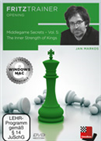Intuition, decision-making and inspiration
The conference titled "Chess and Sports Science", a joint event of the Hungarian University of Sports Science (TF) and the Hungarian Chess Federation, will be held on 9 September at TF.
The conference called "Chess and Sports Science", which is organised by the Hungarian University of Sports Science (TF) and the Hungarian Chess Federation, will be held on 9 September as a side event of the 45th Open and 30th Women's Chess Olympiad, which will take place in Budapest between 10 and 23 September.
The bilingual (Hungarian and English) event will be opened by TF's Rector Professor Tamás Sterbenz in the Rome room (C201). This will be followed by a speech to be delivered by President of the Hungarian Chess Federation Dr Zoltán Polyánszky, who is also Head of the decision-making body of the Organising Committee of the 2024 Budapest Chess Olympiad.
The morning session will also include a lecture titled "Inspirations from the World of Professional Chess" by the Slovak chess GM and three-time national champion Ján Markos.
 In this video course, kings will play a role of strong and active pieces. We will explore how Kings can be helpful in defence and prophylaxis, or even in attack!
In this video course, kings will play a role of strong and active pieces. We will explore how Kings can be helpful in defence and prophylaxis, or even in attack!Markus Raab, Professor and Director of the Department of Performance Psychology at the German Sport University, Cologne will give a presentation on "When can chess players trust their intuition? A research program testing personal, situational and task characteristics of chess decision-making", while Hungarian psychologist and mathematician Professor László Mérő will deliver a lecture entitled "Organising the game – what makes a game good?"
In the afternoon, conference participants can play simuls with Jan Markos and Péter Sármási in the Assembly Hall. The event will be closed in the Rome room by Markus Raab's workshop for PhD students entitled "Sport psychology and individual diagnostic and training tools for elite athletes".
The detailed program is available by clicking here.

GM Jan Markos at the ChessBase studios
Program
- 10.00 Prof. Dr Tamás Sterbenz (Rector of the Hungarian University of Sports Science): Chess and sports science
- 10.20 Dr Zoltán Polyánszky (President of the Hungarian Chess Federation): Welcome speech
- 10.30 Ján Markos (Slovak chess grandmaster and three-time national champion): Inspirations from the world of professional chess
- 11.45 Prof. Dr Markus Raab (Director of the Department of Performance Psychology, German Sport University Cologne): When can chess players trust their intuition? A research program testing personal, situational and task characteristics of chess decision-making.
- 12.30 Prof. Dr László Mérő (Hungarian research psychologist and mathematician): Game Design - What makes a game good? (in Hungarian)
- 14.15-17.00 Ján Markos, Péter Sármási: Simuls with 16 participants (Aula)
- 14.15-15.30 Prof. Dr Markus Raab's workshop for PhD students: Sport psychology and individual diagnostic and training tools for elite athletes
Venue: Hungarian University of Sports Science, Rome room (lectures) and Assembly Hall (simuls)
Time: 10:00-15:30 CET, 9 September 2024
Let us learn together how to find the best spot for the queen in the early middle�game, how to navigate this piece around the board, how to time the queen attack, how to decide whether to exchange it or not, and much more!
Links
























